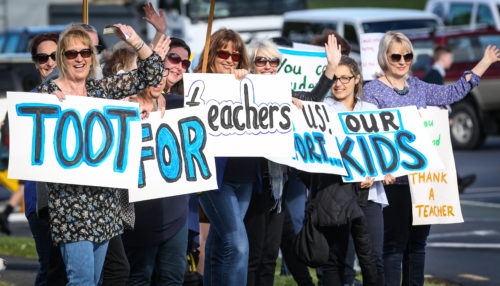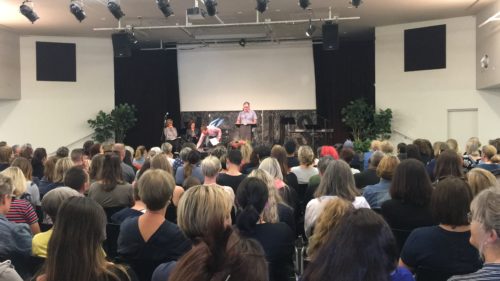 The energy at the Picton Centre on Monday morning was contagious with more than 350 local teachers gathered to discuss the possibility of further strike action.
The energy at the Picton Centre on Monday morning was contagious with more than 350 local teachers gathered to discuss the possibility of further strike action.
They had all spent the morning waving banners and placards on street corners around east Auckland campaigning for better pay, greater learning support and manageable workloads and class sizes.
Now they had come together to weigh up the pros and cons of the Government’s latest offer.
The offer gives teachers a 3 per cent pay increase over three years, a new top pay step for teachers with degrees from November 2020, removal of the qualifications cap for teachers without degrees from November 2020 and a $500 lump sum for NZEI members only.
The government have also announced an additional 600 learning support staff positions.
However the teachers gathered in the Picton Centre seemed unified in their concern that the offer neglects to address many of the issues that have caused the crisis in primary education.
Teachers said that the offer did not address the issues of recruitment and retention of teachers nor did it address issues of class sizes, workload and classroom release time.
They also said with around 2000 primary and intermediate schools, 600 learning support staff barely scratched the surface.
“When will our schools see the benefits of these learning support staff?” was the burning question on every teacher’s lips.
They also worried that Education Minister Chris Hipkins was misleading the public with comments about a $10,000 pay increase when, in reality, the highest pay scale would only see around a $27 a week increase from this offer straight away.
Teachers were then given the opportunity to share with their fellow teachers how they felt about the strike, about what is being offered by the Government and where they might want to go next.
The passion and unity among the teachers from all the local primary schools was unmistakable.

Tom Huskinson, a teacher at Botany Downs Primary School, encouraged the group of teachers to remember that it is “okay to want more than what [govt] are offering”.
He said if they voted to reject the offer, this would mean a quantum leap in their fight.
“We need to be clear that the Government has said there is no more money. To win, we will need to force the Government to change the fiscal rules that it has committed to,” he said.
“It will take a quantum jump in our fight, a tougher, harder campaign next year that is likely to require further and more intensive industrial action.”
He encouraged the group to weigh up the pros and cons of both options and listen to what one another had to say.
“We may not agree but every member’s point of view is valid. I encourage you all to consider and respect every view from every teacher here. It’s up to us what happens next.”







